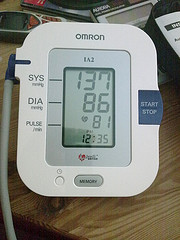Drug Used in Treatment of Hypertension
Antihypertensive drugs are medicines that help lower blood pressure in people whose blood pressure is too high. Blood pressure is a measurement of the force with which blood moves through the body's system of blood vessels.
The whole 12 pages article is available for download here.
Although everyone's blood pressure goes up and down in the course of a typical day, some people have blood pressure that stays high all the time. This conditionis known as hypertension. Hypertension is not the same as nervous tension. People who have high blood pressure are not necessarily tense, high-strung, ornervous. They may not even be aware of their condition. Being aware of high blood pressure and doing something to control it are extremely important, however. Untreated, high blood pressure can lead to diseases of the heart and arteries, kidney damage, or stroke, and can shorten life expectancy.
Treatments for high blood pressure depend on the type of hypertension. Most cases of high blood pressure are called essential or primary hypertension, meaning that the high blood pressure is not caused by some other medical condition. For most people with primary hypertension, it is difficult to figure out the exact cause of the problem. However, such hypertension usually can be controlled by some combination of antihypertensive drugs and changes in daily habits (such as diet, exercise, and weight control).
Controlling primary hypertension is however a lifelong commitment. Although people may be able to reducethe amount of medicine they take as their blood pressure improves, they usually must continue taking it for the rest of their lives. In people with secondary hypertension, the high blood pressure may be due to medical problems such as kidney disease, narrowing of certain arteries, or tumors of the adrenal glands. Correcting these problems often cures the high blood pressure, and no further treatment is needed.
Antihypertensives are a class of drugs that are used in medicine and pharmacology to treat hypertension (high blood pressure). There are many classes of antihypertensive, which-by varying means-act by lowering blood pressure. Evidence suggests that reduction of the blood pressure by 5-6 mm Hg can decrease the risk of stroke by 40%, of coronary heart disease by 15-20%, and reduces the likelihood of dementia, heart failure, and mortality from cardiovascular disease.
The fundamental goal of the treatment should be the prevention of the important "endpoints" of hypertension such as heart attack, stroke and heart failure. Several classes of medications are effective in reducing blood pressure. However, these classes differ in side effect profiles, ability to prevent endpoints, and cost. The choice of more expensive agents, where cheaper ones would be equally effective, may have negative impacts on national healthcare budgets.The term "hypertension" means an abnormally raised arterial blood pressure.There are many conditions which elevate arterial blood pressure including primary renal disease, pheochromocytoma, hyperthyroidism, hyperaldosteronism, and coarction of aorta, leading to secondary hypertension .In about 80 to 85% of patients of hypertension, no significant cause is evident such condition is called primary hypertension. The recommended dosage depends on the type, strength, and form of antihypertensive drug.
The whole 12 pages article is available for download here.

